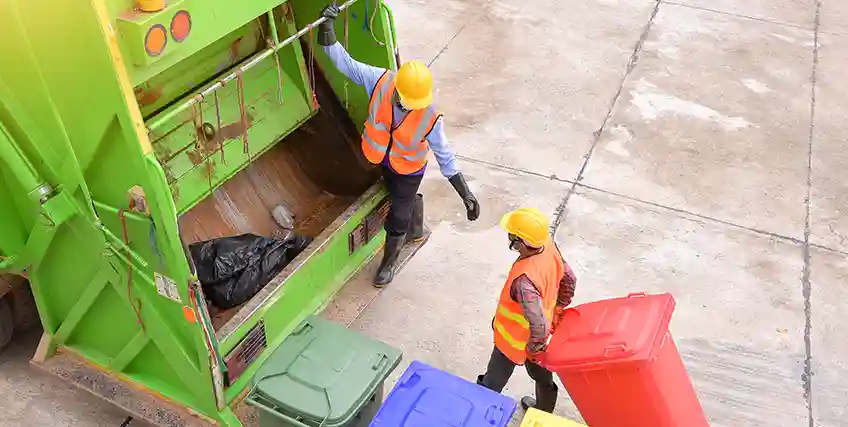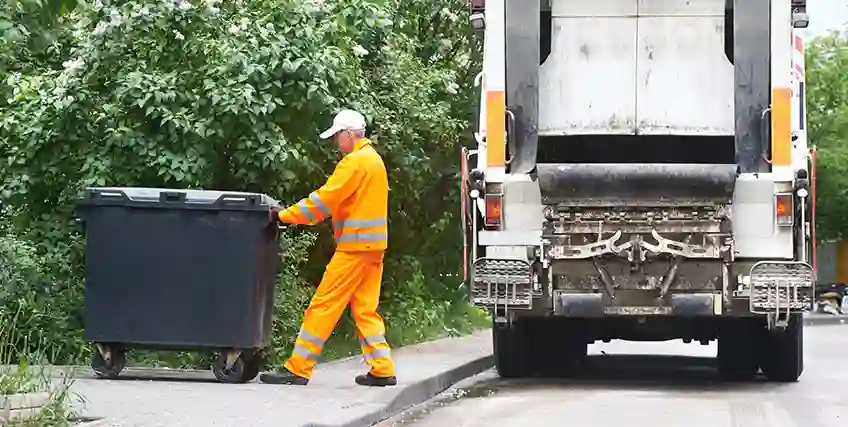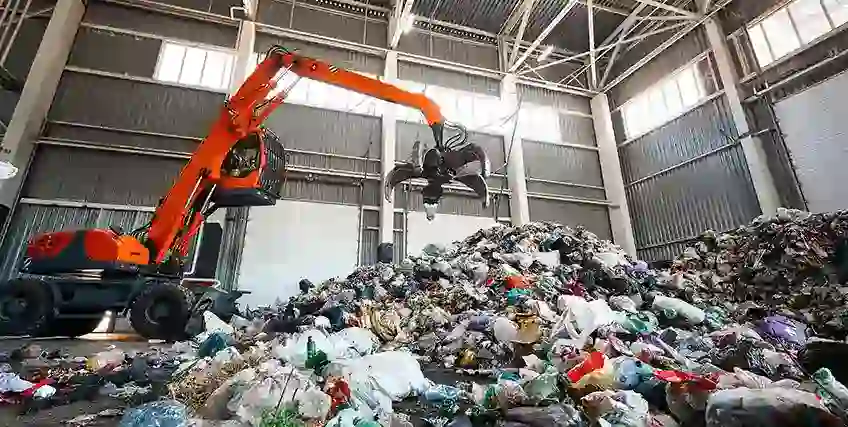How to Finance Your Waste Collection Business: Truck & Equipment Loans
December 02, 2025 | Last Updated on: December 02, 2025

Operating a waste collection business is a complex business. Waste management requires much more than simply collecting trash. Entrepreneurs have a continuous responsibility to find ways to improve solid waste management that requires frequent innovation and investment in equipment needs, from crushers to shredders, grinders, and everything in between. Ensuring smooth and sustainable operations often requires finding the right financing solutions. Small businesses in the waste management business may lean on recycling equipment financing and other types of funding options to address a wide range of business needs.
In this article:
- Explore the challenges that recycling companies and other waste management firms face.
- Learn how recycling equipment financing and other financing solutions can support business needs.
- Explore the best loan options for equipment purchases, business expansion, and more business needs.
Challenges in the Waste Management Industry
Waste management has evolved significantly in recent decades as both the public and private sector have put more of an emphasis on greener practices. This has put the burden on waste management businesses to improve waste disposal techniques but that’s just the tip of the iceberg for today’s waste management businesses. These are some of the most common challenges facing this industry today:
- Sustainability: Waste management businesses play a crucial role in reducing the environmental impact of waste, requiring investment in advanced recycling technology, waste-to-energy solutions, and efficient waste disposal methods. Recycling equipment financing can support this mission.
- Population growth: A larger population means more waste, and the space designated to manage that waste isn’t growing nearly as fast as the population itself. That means waste management companies have to increase operational efficiency by improving their methods and leveraging tools like recycling equipment financing to ensure they’re using the most up-to-date equipment.
- Hazardous waste: Material handling is crucially important in waste management, especially in an age when people have easier access to toxic waste and are exceedingly casual with how they dispose of hazardous materials.
- Competition: While there will always be waste, competition for new markets can be fierce. That’s another reason why investing in green practices like upgrading recycling plants or implementing eco-friendly waste treatment solutions is valuable. Towns and cities are more likely to work with more sustainable operations, but you need to be able to balance an investment in environmental sustainability with being able to offer competitive pricing. This is one more reason that recycling equipment financing can be an attractive option.
- Borrowing challenges: From recycling equipment financing to term loans, lenders may see the upfront investment required for waste management projects, the long project timelines, and regulatory complexities, and balk at approving funding. This can make it a bit harder to secure financing without a clear business plan.
How to Utilize Waste Management Financing
Waste management companies can leverage recycling equipment financing and other types of loans in a wide variety of ways. Here are some of the ways financing for waste management can be utilized:
- Equipment: Recycling equipment financing or other equipment loans can allow you to purchase waste collection trucks, compactors, balers, and recycling machinery to improve waste management efficiency and sustainability. You could even use it for used equipment to save some money.
- Expanding facilities: Loans can help you acquire or renovate land for landfill operations, recycling centers, or waste-to-energy plants to serve more customers.
- Upgrading technology: Financing may allow you to implement automated sorting systems, AI-driven waste tracking, and eco-friendly disposal methods.
- Meeting regulatory requirements: You may have to invest in emission control systems and proper waste treatment solutions to stay compliant with environmental laws.
- Manage day-to-day costs: You can use loans to cover payroll, fuel expenses, maintenance, and unexpected costs without disrupting cash flow.
- Scaling services: Loans can help you expand fleets, introduce specialized disposal units, and improve logistics to serve more communities.
- Consolidate debt: You can also use loans for refinancing or consolidating existing debt to make your monthly payments more manageable.
Types of Waste Management Financing
Like any business, waste management companies may reach a point when they’re struggling to grow or increase efficiency with their current financials. As our April 2025 Small Business Earnings Report found, many small businesses are seeing upticks in earnings, but revenues and expenses remain low, indicating a lack of financial flexibility to reinvest in the business. There are, however, plenty of financing options to upgrade equipment, expand service, meet stricter environmental regulations, and address all kinds of business challenges.
From government-backed loans to specialized recycling equipment financing options, small business owners have several funding solutions available to help scale operations, improve efficiency, and stay ahead in a constantly innovating industry.
Term loans: The classic, conventional loan program involves a lender paying your business an upfront, lump sum of cash that you may use for most business needs business need. Term loans give you flexibility to invest in many aspects of your business while you repay the loan over a fixed period with predictable monthly payments. These loans can be a good option for companies looking to invest in new waste management equipment financing, upgrading recycling facilities, expanding operations, or managing large-scale waste disposal projects. The application process is typically simpler and faster with online lenders than traditional lenders.
SBA loans: Backed by the U.S. Small Business Administration (SBA), these loans are partially guaranteed by the federal government, lowering the risk to both the borrower and lender. As such, they tend to have the most competitive interest rates. However, they also have the strictest qualification requirements. Nonetheless, they’re worth exploring when you’re considering any large-scale project.
Equipment financing: Waste management companies require a huge array of equipment. From guaranteed semi truck financing to recycling equipment financing, many lenders offer equipment loans that can meet your business’s specific needs. These loans typically use the equipment itself as collateral to secure the loan, which allows lenders to offer more competitive interest rates so you can get necessary equipment without the burden of large upfront costs.
Business lines of credit: Companies in need of flexible working capital can get ongoing access to funds with a revolving line of credit. These loans give you access to a maximum amount of capital that you can withdraw to cover payroll, maintenance, and many more expenses. You only pay interest on what you withdraw and, once the borrowed balance is repaid, you’ll have access to the full line of credit again.
Commercial real estate loans: As businesses grow, they need larger recycling plants, expanded landfill sites, or upgraded processing facilities. They often just need more property. Commercial real estate loans provide the funding to purchase, renovate, or refinance these properties, ensuring waste management companies have the infrastructure to support long-term growth.
Revenue-based financing: Waste management businesses may have to deal with fluctuating revenue, which can complicate traditional financing options. With revenue-based financing, rather than making fixed monthly payments, you repay a loan as a percentage of your estimated future receivables.
Each of these financing options can help keep waste management businesses efficient and financially stable. In a constantly evolving regulatory environment and a competitive market, recycling equipment financing and other financing solutions may allow you to build a solid financial foundation while giving you a great ability to plan for the future.
How to Get a Business Loan
The application process varies between the loan product and lender, but generally, if you’re considering financing, you should follow this process:
- Determine funding needs: Knowing how you’ll use the money will inform the type of loan you pursue and how much you need. For instance, recycling equipment financing is a much more suitable solution to upgrade a specific piece of equipment than if you need to cover payroll costs in the slowest time of year. Create a clear business plan for how you’ll use any capital so you know just how much you need and can show your lender there’s a plan to pay them back.
- Research and compare lenders: Most lenders consider a credit score, time in business, and annual revenue when deciding whether or not to approve a loan application. Take the time to review your credentials and research lenders to see their eligibility requirements for different loan products, as well as the interest rates they typically offer. Some lenders may allow you to get pre-approved to see the most likely loan terms before signing.
- Gather documentation: When you’ve found the right lender, it’s time to get ready to formally apply. You’ll typically need basic business information, your tax returns, and financial and bank statements, but you may also need licensing details and proof that you’re in compliance with regulatory requirements. If applying for recycling equipment financing or other secured loans, you’ll also have to provide collateral.
- Apply: Many lenders today allow you to apply online in a streamlined process. Others, however, may require you to apply on the phone or meet with a loan officer in person.
Final Thoughts
Waste management financing solutions can help your company innovate, improve efficiency, expand, and much more. From recycling equipment financing and waste equipment financing to secure new types of equipment, to real estate loans to acquire new property, many types of funding options are available. Waste management companies face a constant struggle to keep up with environmental regulations and sustainable practices, and financing solutions can support that mission.
FAQs
How do waste management companies make money?
Waste management companies make money in a few ways, but by far the biggest revenue driver is collection operations. Public and private entities pay waste management firms to pick up solid waste and recyclables and transport them to a transfer station, material recovery facility (MRF), or landfill.
What are the best loan options for waste management companies?
Depending on their specific needs, waste management companies might consider equipment financing, term loans, SBA loans, commercial real estate loans, and other types of loans.
What is an example of equipment financing?
Equipment financing is used to buy or lease pieces of equipment. For instance, if a waste management company needed a new compactor at a landfill, a lender could pay for the new equipment upfront in exchange for the company paying them for the equipment, plus interest, over time. If the compactor was $100,000, the lender pays the full amount to the seller directly, and the company (borrower) pays the lender over a negotiated time period with monthly payments that include interest.
How can waste management companies use government grants or subsidies?
Many local, state, and federal grants are available to waste management companies. These grants and subsidy programs can reduce financial burdens when companies invest in sustainability initiatives. You can apply for grants through environmental agencies, local municipalities, or federal programs designed to promote green initiatives.
Should waste management companies buy or lease equipment?
There are pros and cons to both. Leasing equipment allows businesses to access the latest technology with lower upfront costs and often lower monthly payments. Plus, you won’t be responsible for the maintenance and upkeep of the equipment. Purchasing equipment through recycling equipment financing may be cheaper in the long run, but it requires substantial upfront investment.




